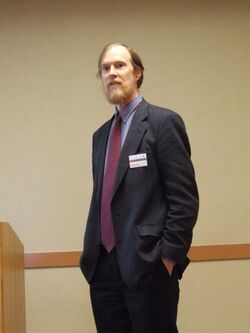Biography:Douglas W. Jones
Douglas W. Jones | |
|---|---|
 | |
| Born | Douglas Warren Jones |
| Nationality | American |
| Occupation | University professor, computer scientist |
| Alma mater |
|
| Known for | computer security, electronic voting |
| Awards | Phi Kappa Phi, Tau Beta Pi |
| Scientific career | |
| Fields | Computer science |
| Institutions |
|
| Thesis | The Systematic Design of a Protection Mechanism to Support a High Level Language (1980) |
| Doctoral advisor | Thomas T. Chen[1] |
| Website | divms |
| Writing career | |
| Genre | Science fiction |
| Notable works | 1632 series short stories |
| Years active | 2005–2013 (Science Fiction) |
Douglas W. Jones is an American computer scientist at the University of Iowa. His research focuses primarily on computer security, particularly electronic voting.
Jones received a B.S. in physics from Carnegie Mellon University in 1973, and a M.S. and Ph.D. in computer science from the University of Illinois at Urbana-Champaign in 1976 and 1980 respectively.
Jones' involvement with electronic voting research began in 1994, when he was appointed to the Iowa Board of Examiners for Voting Machines and Electronic Voting Systems. He chaired the board from 1999 to 2003, and has testified before the United States Commission on Civil Rights,[2] the United States House Committee on Science[3] and the Federal Election Commission[4] on voting issues. In 2005 he participated as an election observer for the presidential election in Kazakhstan. Jones was the technical advisor for HBO's documentary on electronic voting machine issues, "Hacking Democracy", that was released in 2006.[5] He was a member of the ACCURATE electronic voting project from 2005 to 2011. On December 11, 2009, the Election Assistance Commission appointed Douglas Jones to the Technical Guidelines Development Committee.[6]
Together with Barbara Simons, Jones has published a book on electronic voting entitled Broken Ballots: Will Your Vote Count?.[7] Jones's most widely cited work centers on the evaluation of priority queue implementations.[8] This work has been credited with helping relaunch the empirical study of algorithm performance.[9] In related work, Jones applied splay trees to data compression and developed algorithms for applying parallel computing to discrete event simulation.[10][11][12] Jones's PhD thesis was in the area of capability-based addressing,[1] and he has occasionally published on other aspects of computer architecture.[13] He has published work on computer architecture on an occasional basis, such as his proposal for a one-instruction set computer.[14]
References
- ↑ 1.0 1.1 Jones, Douglas Warren (1980). The systematic design of a protection mechanism to support a high level language (Ph.D.). University of Illinois at Urbana-Champaign. OCLC 741982997 – via ProQuest.
- ↑ "Evaluating Voting Technology". http://homepage.cs.uiowa.edu/~dwjones/voting/uscrc.html.
- ↑ "Problems with Voting Systems and the Applicable Standards". http://homepage.cs.uiowa.edu/~dwjones/voting/congress.html.
- ↑ "Voting System Standards Work that Remains to be Done". http://homepage.cs.uiowa.edu/~dwjones/voting/fec3.html.
- ↑ "IMDb: Full cast and crew for Hacking Democracy". https://www.imdb.com/title/tt0808532/fullcredits.
- ↑ United States Election Assistance Commission, New Technical and Scientific Experts Appointed to EAC’s Technical Guidelines Development Committee, Press Release , December 11, 2009.
- ↑ Douglas W. Jones and Barbara Simons, Broken Ballots, Center for the Study of Language and Information / University of Chicago Press, 2012.
- ↑ Jones, D. W. (April 1986). "An empirical comparison of priority-queue and event-set implementations". Comm. ACM 29 (4): 300–311. doi:10.1145/5684.5686.
- ↑ Bernard M. E. Moret, Towards a discipline of experimental algorithmics, Data Structures, Near Neighbor Searches, and Methodology: Fifth and Sixth DIMACS Implementation Challenges DIMACS Series on Discrete Mathematics 59, M.H. Goldwasser, et al, eds., 197-214; see section 3.1, page 202.
- ↑ D. W. Jones, Application of splay trees to data compression, Comm. ACM 31, 8 (August 1988), 996-1007.
- ↑ D. W. Jones, Concurrent simulation: an alternative to distributed simulation, Proc. WSC '86, 18th Winter Simulation Conf., 417-423.
- ↑ D. W. Jones, Concurrent operations on priority queues Comm. ACM 32 1 (January 1989) 132-137.
- ↑ D. W. Jones, Systematic Protection Mechanism Design, Systematic protection mechanism design. Proc. ASPLOS I, First International Symp. on Architectural Support for Prog. Languages and Op. Sys, 77–80.
- ↑ D. W. Jones, The ultimate RISC, SIGARCH Computer Architecture News 16 3 (June 1988) 48–55.
External links
- Douglas Jones' website
- NPR Science Friday interview on voting technology
- NPR Talk of the Nation interview on voting technology
- Douglas W. Jones at the Internet Speculative Fiction Database
 |

